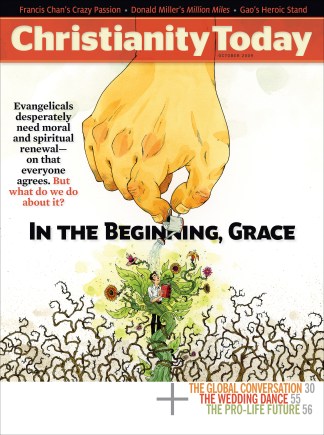In recent years Great Britain’s chief export to the U.S. has been a payload of books by atheist authors such as evolutionary biologist Richard Dawkins and literary critic Christopher Hitchens. They contend that faith is irrational in the face of modern science. Other prominent British atheists seem to be having second thoughts. Is there some revival sweeping England? No; they are examining the rationality of Christianity, the very beliefs Dawkins and others are so profitably engaging, but are coming to opposite conclusions.
Well-known scholar Antony Flew was the first, saying he had to go “where the evidence [led].” Evolutionary theory, he concluded, has no reasonable explanation for the origin of life. When I met with Flew in Oxford, he told me that while he had not come to believe in the biblical God, he had concluded that atheism is not logically sustainable.
More recently, A. N. Wilson, once thought to be the next C. S. Lewis who then renounced his faith and spent years mocking Christianity, returned to faith. The reason, he said in an interview with New Statesman, was that atheists “are missing out on some very basic experiences of life.” Listening to Bach and reading the works of religious authors, he realized that their worldview or “perception of life was deeper, wiser, and more rounded than my own.”
He noticed that the people who insist we are “simply anthropoid apes” cannot account for things as basic as language, love, and music. That, along with the “even stronger argument” of how the “Christian faith transforms individual lives,” convinced Wilson that “the religion of the incarnation … is simply true.”
Likewise, Matthew Parris, another well-known British atheist, made the mistake of visiting Christian aid workers in Malawi, where he saw the power of the gospel transforming them and others. Concerned with what he saw, he wrote that it “confounds my ideological beliefs, stubbornly refuses to fit my worldview, and has embarrassed my growing belief that there is no God.” While Parris is unwilling to follow where his observations lead, he is obviously wrestling with how Christianity makes better sense of the world than other worldviews.
While we can’t reason our way to God, I’ve long believed that Christianity is the most rational explanation of reality.
Could this signal a trend? Well, not yet. But it does illustrate something I have been teaching for years: Faith and reason are not enemies. We are given reason as a gift. And while we can’t reason our way to God (only the power of God can transform fallen men—I’ve seen that in prisons for over 32 years), I have long believed that Christianity is the most rational explanation of reality. And that fact, winsomely explained, can powerfully influence thinking people to consider Christ’s claims.
A strong empirical case can be made to show that Christianity is the only rational explanation of life. For the past six years, I’ve been teaching students in the Centurions Program to draw a grid listing the four basic questions that most people ask about life: Where did I come from? What’s my purpose? Why is there sin and suffering? Is redemption possible? Then, on the other side of the matrix, we list the various philosophies and prominent world religions. By examining how each view answers the four questions, we can determine which worldviews conform to the way things really are. This is the correspondence theory of truth—a thoroughly rational test.
Students quickly see that only Christianity teaches that humans are created in the image of God, thus protecting their dignity. It’s no coincidence that Christians have waged most of the great human rights campaigns.
Or take the question of sin. If people are good, as French political philosopher Rousseau argued, problems can be solved by creating a utopian state. Yet all of history’s utopian schemes have ended in tyranny. Meanwhile, Eastern religions see life as an endless cycle of suffering. There’s no way for sin to be forgiven. And grace is an unknown concept in Islam.
This is nothing particularly novel. A long history of prominent atheists, interestingly concentrated in Britain, have traveled back to faith. These doubters began to examine the rationality of Christianity’s claims. Whether in the Victorian era, with Thomas Cooper, George Sexton, and Joseph Barker, or in the 20th century, with T. S. Eliot, Graham Greene, and C. S. Lewis, all of them concluded that the Bible speaks most accurately to the human condition—the very definition of a rational choice. It is rational to choose the worldview that provides the best choice for living, consistent with the way life works.
What does this tell us? People today have a caricatured view of Christians, seeing us as followers, often hypocritical and judgmental, of an outdated book of mere illusions. But if we can explain why Christianity is so reasonable, our faith becomes a very winsome proposition, which will at least open the mind, if not the heart, of many a doubter.
Copyright © 2009 Christianity Today. Click for reprint information.
Related Elsewhere:
Christianity Today‘s previous articles on atheism include:
Reframing Human History | How we got into the atheism culture war in the first place. A review of David Bentley Hart’s Atheist Delusions. (September 23, 2009)
Where to Find the Real Atheists | Lent teaches us how much we Christians hate God. (April 2, 2009)
New Atheists Are Not Great | In What’s So Great About Christianity, Dinesh D’Souza is skeptical of skepticism and enthusiastic about the faith. (March 13, 2008)
Previous columns by Charles Colson are available on our website.










